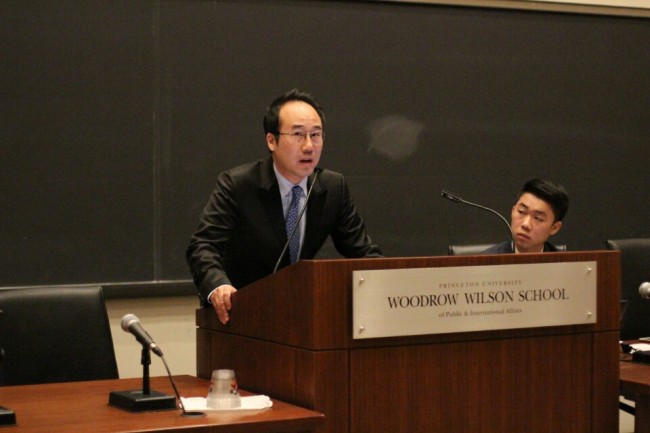Even after eight years of dedicated struggle and failed attempts to hold a unified South and North Korean orchestra performance, violinist and human rights activist Won Hyung-joon has not lost hope.
Inspired by the work of Daniel Barenboim, who in 1999 founded the West-Eastern Divan Orchestra composed of Israeli and Palestinian musicians, Won established the Lindenbaum Music Company in 2009, combining his musical and humanitarian efforts to forge a historic orchestra alliance between the two hostile Koreas.
 |
Violinist Won Hyung-joon (Park Jong-bum) |
“I am one of the separated families,” said Won during an interview with The Korea Herald at a cafe in Seoul on Monday.
“My great-grandmother’s tomb is located in Gaeseong in North Korea. I would see my grandfather feeling so lonely because he wasn’t even able to visit his late mother’s grave. And the same for me, I have never ever been able to visit her tomb,” he added.
“In music, we don’t need to talk,” Won continued. “And in music, you don’t see any ideological complications. With music, we have to listen first in order to make harmony and I have been trying to give this message to the public and politicians of both countries to adopt this model of cultural exchange. We can try to change the future in other ways, but this could be a strong message because it gives inspiration to people.”
Won recently returned to Seoul after spending three weeks in the U.S., giving lectures at some of the country’s top universities -- Harvard, Princeton and Georgetown. In his talks, the musician spoke about his efforts and the importance of establishing the joint ensemble, as well as using the international platform to further educate young students about the current political situation on the Korean Peninsula.
 |
Violinist and human rights activist Won Hyung-joon speaks to students and faculty members at Harvard University in Boston on Feb. 10. (Joseph Choe/Harvard Political Review) |
“When I talked about my stories and the current political situation (between the South and North), they were very surprised,” Won said. “Of course we all know about the human rights issues in North Korea, but when I mentioned that even from our side, the South, we still need government permission to contact people up North, they were shocked, they had no idea. I mean this is the 21st century, we have the Internet and we can communicate with people from any country, but on the Korean Peninsula, that is not the case.”
“It’s more than just unifying the South and North, it’s also about discovering hope in conflicted nations,” he added. “Just imagine people in conflicted nations coming together through music and producing harmony, I think all this can be possible because of the value of music.”
Last year, Won came painstakingly close to achieving his dreams; suffice it to say most people in his shoes would have probably given up all hope.
On Aug. 15 last year, the nation celebrated 70 years of liberation from Japanese colonial rule over the Korean Peninsula. In honor of the historic day, Won organized a 70-person North Korean choir to stand on its respective side of the 38th parallel in the truce village of Panmunjom and the 80-member Lindenbaum Festival Orchestra (an ensemble of volunteer musicians) to stand on the opposite side to perform Korean folk song “Arirang” and Beethoven’s Symphony No. 9.
“Beethoven’s Symphony No. 9 is a song about brotherhood, it’s about humanism,“ Won explains. “He wrote this piece when he was deaf, and he wrote this piece for mankind, not for his kids, not for royalty, but for peace and humanism.”
However, less than two weeks before the momentous performance date, two South Korean soldiers were severely injured by North Korean land mines near one of the South’s military guard posts at the DMZ. The incident caused an uproar in the South and led to a huge spike in border tensions.
 |
Violinist and human rights activist Won Hyung-joon lectures at the Woodrow Wilson School of Public & International Affairs at Princeton University in Princeton, New Jersey, on Feb. 13. (Princeton University) |
After Won and his ensemble waited patiently in a bus outside the Unification Bridge for more than two hours, in hopes that the incident would not alter their scheduled event, the violinist received some devastating news -- the performance had been canceled.
“It was Aug. 15, the 70th anniversary of our Liberation Day. I just thought to myself, I’m Korean, but I’m still not allowed to step on the other side of our territory. And this is still happening after 70 years,” he said.
Won is certainly no stranger to demoralizing setbacks. In 2011 he made his first attempt at forging a unified Korean Orchestra to perform in Pyeongyang. In 2013 he tried once again to hold performances in Switzerland and in 2014 in Germany. However, despite jumping through countless political hoops to obtain permission from all participating parties, all his efforts have been fruitless.
“I think my intentions have been very clear. It’s just a simple message, to let us play music with North Korea,” he said.
“Music touches the human soul,” he explained. “So many politics and politics between countries are just rhetoric without real meaning. But, with music, you don’t need to explain anything -- you play, people will listen and they will feel it.”
Won said that following his recent U.S. trip, he is continuing to promote his cause and appeal to any international organization willing to help the cause.
“I strongly believe that music can help solve problems for society,” he stated. “I mean as musicians, we are not making coffee or iPhones, we are just trying to make society beautiful. Until the day I die, I will keep trying to make this dream happen.”
By Julie Jackson (
juliejackson@heraldcorp.com)










